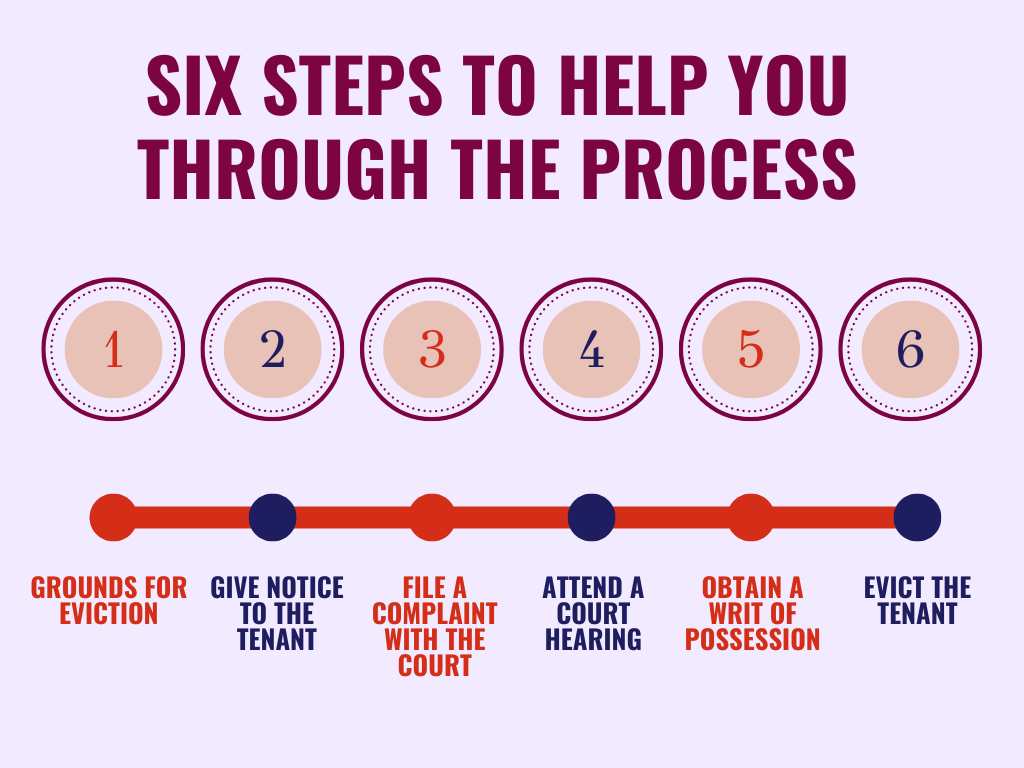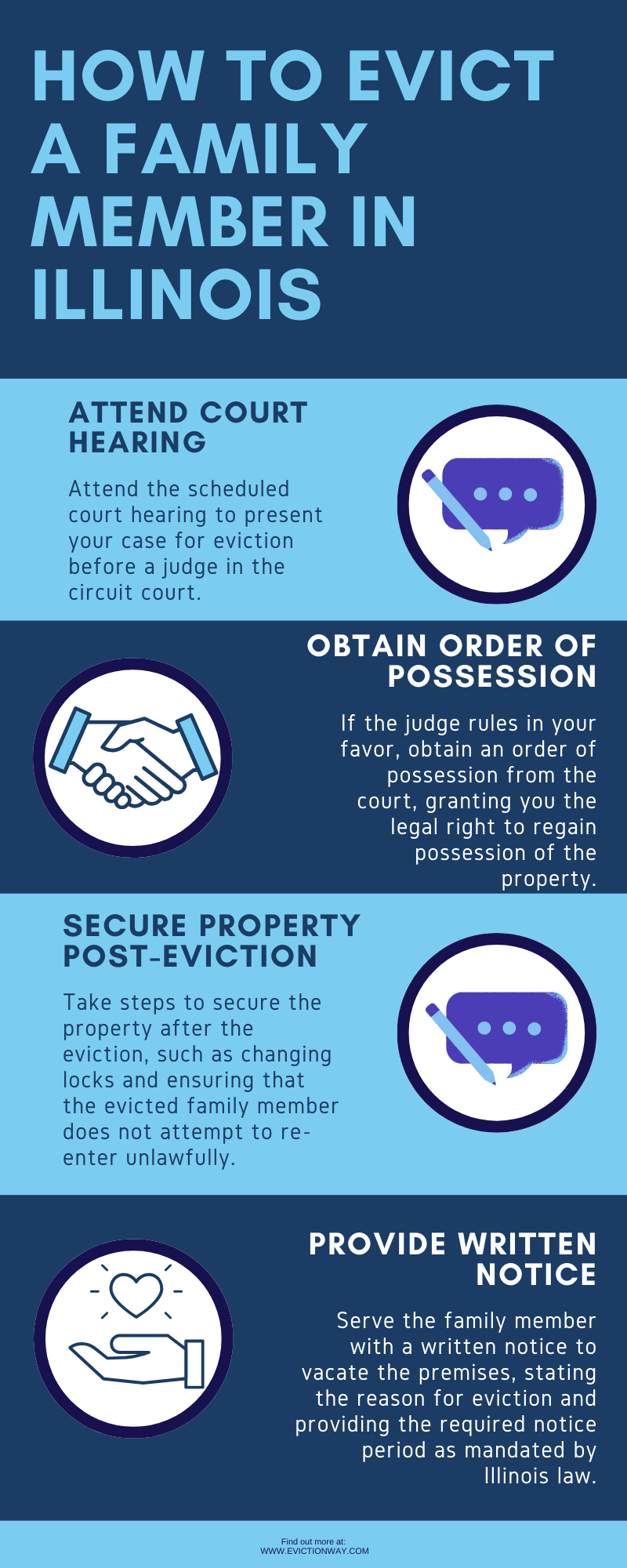Evicting a family member can be a difficult and emotional process, but it may be necessary to protect your rights and property. If you’re facing this situation in Illinois, this blog article will provide you with the information you need to navigate the legal process and evict your family member in a respectful and efficient manner.
We’ll share the step-by-step process for evicting a family member in Illinois, including the legal requirements and procedures you need to follow. We’ll also provide tips on how to approach the situation with sensitivity and minimize conflict.
In addition to the legal process, we’ll also discuss the emotional and practical challenges of evicting a family member. We’ll share tips on how to communicate your decision effectively, deal with resistance, and protect your own well-being throughout the process.

How To Evict a Family Member In Illinois
Evicting a family member can be a difficult and emotional process, but it is sometimes necessary to protect your rights and property. If you are considering evicting a family member in Illinois, it is important to understand the legal process and your rights as a landlord.
1. Determine if You Have Grounds for Eviction
In Illinois, there are several grounds for eviction, including:
- Nonpayment of rent
- Violation of the lease agreement
- Criminal activity
- Nuisance behavior
If you believe that your family member has violated any of these grounds, you can begin the eviction process.
2. Give Notice to the Tenant
The first step in the eviction process is to give your family member a written notice to vacate the property. The notice must state the reason for the eviction and the date by which the tenant must leave.
3. File a Complaint with the Court
If your family member does not vacate the property after receiving the notice, you can file a complaint with the court. The complaint must include a copy of the notice to vacate and a statement of the facts supporting the eviction.

4. Attend a Court Hearing
After you file a complaint, the court will schedule a hearing. At the hearing, you will have the opportunity to present your case to a judge. The judge will then decide whether to grant the eviction.
5. Obtain a Writ of Possession
If the judge grants the eviction, you will be issued a writ of possession. This document gives the sheriff the authority to remove your family member from the property.
6. Evict the Tenant
Once you have obtained a writ of possession, the sheriff will evict your family member from the property. The sheriff will change the locks and remove any belongings that the tenant has left behind.
Additional Resources for Illinois eviction help:
Eviction notice Illinois
In Illinois, when a tenant violates the terms of their lease, the landlord typically issues an eviction notice or a notice to quit. This document notifies the tenant of the breach and allows them a certain number of days to address the issue or move out.
It’s a crucial step in the eviction process and provides tenants with a final opportunity to resolve the issue before further legal action is taken.
You can download Eviction notice Illinois here.
How Much Does it Cost to Evict a Family Member in Illinois?
The cost of evicting a family member in Illinois can vary depending on the specific circumstances of the case. However, there are some general costs that you can expect to incur. These costs include:
| Expense Category | Approximate Cost Range | Notes |
|---|---|---|
| Court Filing Fee | $150 to $379 | Varies greatly by county and the amount of rent owed. |
| Service of Process | $50 to $60 | For serving the eviction notice to the tenant. |
| Attorney Fees | $500 to $10,000+ | Depends on the complexity of the case and the attorney’s pricing. |
| Sheriff’s Eviction Fee | $60.50 | For the sheriff to remove the tenant if they have not vacated. |
| Locksmith (if needed) | $160 | Costs to change locks on the property after the eviction. |
| Storage of Tenant’s Belongings | Varies | If required to store the tenant’s belongings after eviction. |
| Lost Rent (opportunity cost) | Varies | Potential rental income lost during the eviction process. |
| Cleaning and Damage Repairs | Varies | Costs to clean and repair any damages to the property post-eviction. |
| Miscellaneous Expenses | Varies | Includes court appearances, additional legal notices, etc. |
- Filing fees: The filing fee for an eviction lawsuit in Illinois is $150.
- Service of process: The cost of serving the eviction summons on the tenant is typically between $50 and $60.
- Attorney fees: If you hire an attorney to represent you in the eviction process, you can expect to pay between $500 and $10,000.
- Court costs: If the case goes to trial, you may be responsible for paying court costs, such as witness fees and court reporter fees.

FAQs: Evicting a Family Member in Illinois
Here are some of the most frequently asked questions about evicting a family member in the Illinois:
What are the grounds for evicting a family member in Illinois?
In Illinois, you can evict a family member if they have violated the terms of their lease or tenancy agreement, such as by failing to pay rent or causing damage to the property. You can also evict a family member if they are engaging in illegal activities or if they are a danger to themselves or others.
What is the process for evicting a family member in Illinois?
The process for evicting a family member in Illinois is similar to the process for evicting any other tenant. You must first give the family member a written notice to vacate the property. The notice must state the reason for the eviction and the date by which the family member must leave. If the family member does not leave by the deadline, you can file an eviction lawsuit with the court.
Can I evict a family member without going to court?
In some cases, you may be able to evict a family member without going to court. If the family member is willing to leave voluntarily, you can sign a written agreement that states the terms of their departure. You can also try to mediate the dispute with the help of a third party, such as a family counselor or mediator.

What are my rights as a landlord when evicting a family member?
As a landlord, you have the right to evict a family member if they have violated the terms of their lease or tenancy agreement. You also have the right to file an eviction lawsuit with the court if the family member does not leave by the deadline stated in the notice to vacate.
Can you evict someone without a lease in Illinois?
Evicting Without a Lease a landlord can evict a tenant with a renter’s agreement (instead of a lease) after providing at least 30 days’ notice.
How long does it take to evict someone in Illinois?
Evicting a tenant in Illinois typically takes two to five months. The exact timeframe depends on the reason for eviction, the tenant’s cooperation, and the court’s schedule.
What are the resources available to help me evict a family member?
There are a number of resources available to help you evict a family member, including legal aid organizations, tenant advocacy groups, and the court system. You can also find helpful information online and in libraries.
Related:
How to Evict a Family Member in New Mexico
